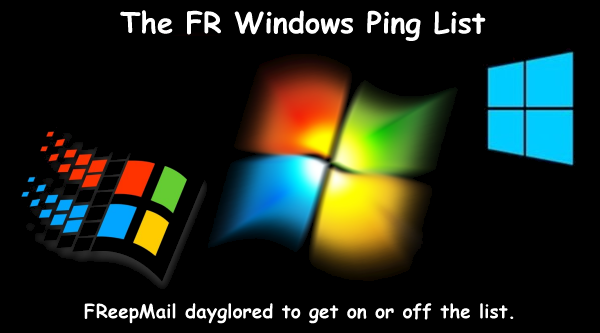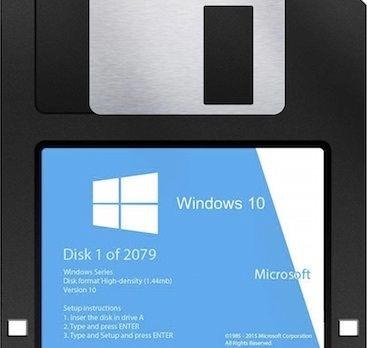 |
 |
|---|
Thanks to upchuck for the ping!!
Posted on 09/02/2016 1:35:58 PM PDT by upchuck
Microsoft is slamming the door on PC builders and upgraders who might have hoped to use the new Intel Kaby Lake or AMD Zen chips for Windows 7 or Windows 8 PCs. Sorry: Both chips are officially supported only by Microsoft’s Windows 10.
Microsoft's mandate is discreet rather than secret. In January, the company tried to shorten its support lifecycle for Intel Skylake PCs running Windows 7 and 8, a policy the company subsequently abandoned after much outcry. But Microsoft’s statements have also consistently included a critical caveat: The latest generations of silicon—specifically Intel’s Kaby Lake chip, Qualcomm’s 8996, and AMD’s Bristol Ridge silicon—will all require Windows 10.
“As new silicon generations are introduced, they will require the latest Windows platform at that time for support,” a Microsoft spokeswoman replied, when asked to confirm that that position was still in place. The goal appears to be to move forward with new features, even if it means leaving some users behind. “This enables us to focus on deep integration between Windows and the silicon, while maintaining maximum reliability and compatibility with previous generations of platform and silicon.”
Why this matters: Microsoft's push forward, however rational from a technology standpoint, robs PC enthusiasts of their choice of operating systems—a freedom this particular sector of the community has loudly defended in the past. This could have broader implications for the PC market, too: It could be the deciding factor that finally brings about the abandonment of Windows 7 and Windows 8.1. (Linux is an option, too, and nothing is precluding Apple from buying the chips for Macs, either.)
(Excerpt) Read more at pcworld.com ...
It isn’t that Microsoft isn’t supporting old operating systems on new chips. Microsoft has agreements with the processor manufacturers to PREVENT the new hardware from working with anything BUT Windows 10. Doesn’t that make the new hardware unusable for Linux or even a privately developed OS? It sure sounds like that to me.
I don’t read this as Microsoft refusing to support old OSs on the new hardware. I read this as Microsoft having the hardware specifically made to prevent any other operating system from working with that new hardware.
Agree. How is 7, 8 or 10 really any better than XP?
 |
 |
|---|
Thanks to upchuck for the ping!!
The obvious (to me at least) fallout for this doesn’t impact MS as much as it will Intel and AMD. If your customer base wants a particular product (Windows 7) and you restrict them for a platform to host their product they simply won’t buy your product. Watch sales of Intel Kaby Lake and AMD Zen chips languish and sales of RAM and (replacement) hard drives spike as users hold on to older hardware longer.
Shortsighted business decision - what I’ve come to expect from Microsoft.
I will bet you anything Win 7 Enterprise will be excluded. I doubt they will force this on their enterprise customers.
I found the answer here...
“One example of Microsoft holding back support is the xHCI USB controller in sixth-generation Skylake and seventh-generation Kaby Lake: Windows 7 doesn’t support that USB hardware, so installing the operating system from a USB stick using those chips is tricky. Intel provides xHCI drivers for Windows 7 once it’s up and running.”
I have to agree with Gideon in post 25. You all are like a bunch of hens, and when the farmer comes into the barn, it's "cluck,cluck,cluck."
Microsoft said they won't SUPPORT Win7 or 8 on the new chipsets. They said nothing about the platform being incompatible. If that were to happen, Intel and AMD would be out on their asses quicker than you can say Bill Gates.
Microsoft is building Windows 10 around specific architectures. Swordmaker can attest, Apple has been doing it for decades. Microsoft is finally saying, "Enough is enough" with the bloatware and the massive catalog of hardware they have to support and are standardizing on specific architectural standards.
This is good news and should be celebrated. Instead, everyone gets whipped into a froth because a dishonest "journalist" has a vendetta against Microsoft.
And for those of you who so proudly proclaim that you've shut off updates to Windows 7, I just have to facepalm you, or, better yet...

Security professionals have spoken on almost a daily basis about the risks to computers due to newer and more sophisticated attack vectors, yet you all think that you're gonna "show Microsoft" by turning off updates? Boy howdy you've shown them! ...how ignorant you can be.
Microsoft has always done the same thing when new chips replace older ones -- and certainly no sane person would argue that Windows 10 should support being run on a 386.
This is different... it's in the opposite direction. This is not a case of "Windows 10 will no longer run on old, weak CPUs". This is a case of "Windows 10 is REQUIRED for new, strong CPUs".
Frankly, the way it looks to me, Microsoft went to Intel and demanded that they redesign certain critical CPU features to be incompatible with Windows 7 and 8, to give Microsoft an excuse for dropping support for the older OSes before their time.
Microsoft's and Intel's long history of back-compatibility is a big part of what made them the worldwide standard computer for the past 3 decades. They have broken that tradition of compatibility for the sake of forcing everyone into the Windows 10 mold.
That's a damn shame, IMO.
I simply cannot afford to replace $60,000 of stuff.
Show me where it specifically states that legacy operating systems won't run on newer Intel/AMD architectures. You'll have a hard time, because it doesn't. This is FUD from this author and from numerous others in the community.
I am a MS engineer and work very closely with them on a weekly basis. This sort of stuff is brought up in meetings often, and I can tell you that MS not only won't do this, they can't.
> Show me where it specifically states that legacy operating systems won't run on newer Intel/AMD architectures. You'll have a hard time, because it doesn't. This is FUD... I can tell you that MS not only won't do this, they can't.
Before I find the articles that claim to quote Microsoft on this, let me be sure we're talking about the same thing, namely:
>> Microsoft says they will not generate the new support code to Win7 and Win8.1 that is required to properly operate the latest and future Intel (and AMD) CPUs.They allegedly said this first about Skylake some months back, but after customer pushback, they backpedaled and said, "Okay, we'll give Win7 and 8.1 support for Skylake... but that's it, no support for Kaby Lake or the AMD equivalents." And by extension, anything after that.
I would LOVE to be wrong about this. So maybe while I'm trying to find the announcements from Microsoft I read, you can find ones where they say the opposite -- that they WILL provide support for the latest and future CPUs for Win7 and 8.1.
You see, I'd be THRILLED to find out that this article is FUD (as you say) and that Win7 and 8.1 WILL get support for these new CPUs. Reason? I have a farm of hardware that we use for (among other things) product compatibility testing including Win7 and 8.1 naturally. And I don't want to have to tear my hair out making sure that future hardware purchases DON'T include the latest CPUs just so that I can run Win7 and 8.1 on them.
So, please, DO show me where Microsoft has pledged to provide support for Kaby Lake and Zen architectures in Win7 and 8.1. You'll make my day. I'm completely serious, no sarcasm here.
As far as the future, I do expect they'll draw a line eventually, just as they did with the 286 and 386 and 486 -- no party lasts forever. :-)
August 11, 2016 9:53 am -- Updates to Silicon Support Policy for Windows -- By Shad Larsen / Director of Windows Business Planning
As previously communicated earlier this year, future silicon platforms including Intel’s upcoming 7th Gen Intel Core (Kaby Lake) processor family and AMD’s 7th generation processors (e.g. Bristol Ridge) will only be supported on Windows 10, and all future silicon releases will require the latest release of Windows 10.Has this been recinded?
Where's the announcement from Intel or AMD? You won't find one. Intel and AMD are chipmakers. They don't give a damn about the endpoints. They provide instruction sets for their UEFI and BIOS chipsets, code drivers for various platforms, and dole out the hardware. What Apple or Microsoft or Linux-du-jour do with the hardware is on them.
My point here is that Microsoft is only providing support for those platforms on Windows 10. Meaning if you install Windows 7 or Windows 8 on a Kaby Lake-based system and something goes wrong, don't expect them to help you if you call or contact them on their support forums. It just won't happen. That will be the very first thing they ask.
If anything, this is more burdensome for the business than the home user. If businesses aren't ready to go to Windows 10, like my company, but Dell or HP or Lenovo are putting out Kaby Lake or Bristol Ridge machines, now there's a support issue if that desktop support group has a platform issue across all of their machines. The home user is going to search across Google or Bing for questions regarding issue X with Windows 7 on a Kaby Lake platform, and people are going to thoroughly insulate themselves by stating from the outset that Microsoft doesn't support Windows 7 on Kaby Lake, but the community of users is such that SOMEONE will find a hack around one of the blockades that Microsoft might put in place.
And that's another thing. Think back to Windows 98 or Windows XP. There's nothing stopping any of you from installing Windows XP on a Skylake-based system. There's nothing in the firmware of the chip that would prevent you from doing so. Now, the system might not function very well. You'll have an exceptionally difficult time finding drivers for XP, but that doesn't preclude you from doing it. Furthermore, you ever try to install Windows 98 in a VM? VMware, Hyper-V, or even VirtualBox, you can do it. Windows 98 WILL run in a virtual environment. Try to install the integration tools and watch everything go down in a flaming pile of shit, but it'll install and run. Try to feed it a 1 GBps NIC, and it'll likely puke, but you installed it.
The point I'm making here is that Microsoft is not coming out and saying that you can not, no way, no how install and/or use Windows 7 or Windows 8 on a newer architecture. They can't say that, because they don't have a say. What they DO have a say in is the software support of those platforms. If there are advanced instruction sets in those chipsets, Microsoft is only going to code Windows 10 to take advantage of those instruction sets. THAT is what they're saying.
The doom and gloom bullshit I read on this forum when it comes to Microsoft is mind-numbing and downright absurd. Microsoft is the company that everyone wants to hate. Hell, half of you still curse Bill Gates' name, and the man hasn't been involved with Microsoft since 2014! Read between the lines on this tech stuff.
Years ago I used to hate Microsoft, use the silly little dollar sign when I wrote Micro$oft. So cute. As I've grown to know the people there and learned the platform and gone through the certification tracks, Microsoft is no different than any other software developer, they're just bigger and when they make even a minor change in how they do business, everyone turns into a headcase.
This article is FUD. Period. Microsoft is simply stating that they will not SUPPORT newer architectures on older Windows operating systems. Doesn't mean you can't upgrade. It means that if something doesn't work, they warned you. Caveat emptor.
Otherwise live in darkness

Looks like a very microsoft-centered article. Linux is going to be supported on these chips. There is no technical reason MS couldn’t issue an update to make Win7 work with them. This is purely a business decision on Microsoft’s part to continue to push people on to Win10. I remember back when I7 was first introduced. At the time, at least until microsoft got off their ass, the only OS you could initially run was Linux.
I’m moving back to the Linux side of the house personally. I support Windows environments from desktops to BI, but for what I do in my home environment, Linux suits me just fine.
So yes, nothing stops the highly-motivated individual from trying things that aren't supported. To borrow your example, it happens that I -do- have Win98 running in a VM (VMware Fusion on my Mac), along with my CentOS 6 and Win7 and Win10. Even have plain MS-DOS running in another VM (the DOS version that lives under 98) -- it's so bloody fast it seems unholy.
But for most Windows users, home and business, that which is unsupported is risky and often not within their limited technical grasp. That's the reason these Chicken Little articles are being written: Not for those of us who are comfortable experimenting (hell, those of us who grew up building homebrew machines with wirewrapped CPUs and hand-assembled BIOS). But for the vast majority of Windows users who will see their options limited to "Windows 10 or nothing" on the new architectures.
Anyway, we agree, we were just coming at it from different angles.
Definitely a business decision, although their thinking isn't "to continue to push people on to Win10," even though that's the end result.
The real business decision is to cut extra development, test and support costs and save a lot of money as a result.
It costs a lot of money to develop software on a new hardware platform that's running your latest software platform/product, and then have to spend additional time and money back porting and sometimes making design changes to then also make the new code run on older software platforms. More work, more testing, more cost all around.
I personally don't blame them from a business perspective. Having to design, test and support new code & features for 3 different operating systems vs. just one will no question cost a lot more money and people resources.
Disclaimer: Opinions posted on Free Republic are those of the individual posters and do not necessarily represent the opinion of Free Republic or its management. All materials posted herein are protected by copyright law and the exemption for fair use of copyrighted works.